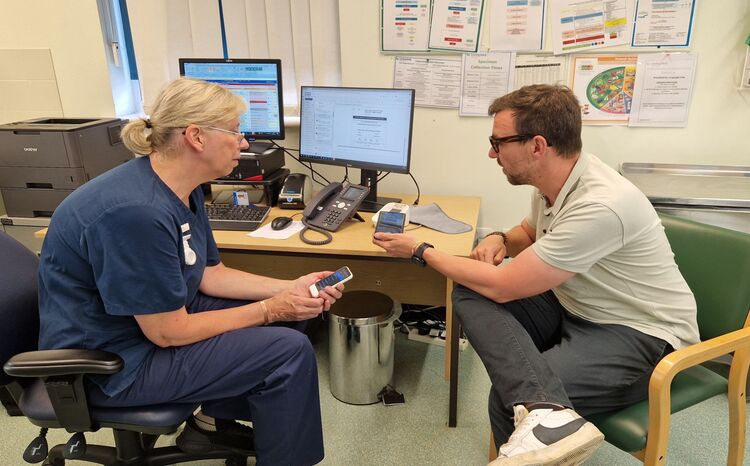GPASSed and gone
- 17 August 2012

Direct from a meeting with consultants in Glasgow, Dr Bill Martin and Dr Bruce Thomson arrive promptly for an interview in Kirklands House, South Lanarkshire.
Their previous meeting, to discuss the electronic discharge summaries sent from Glasgow hospitals to GPs, is just one of many get-togethers they attend on a regular basis.
In fact, when they are asked to list the committees on which they sit, Dr Thomson needs a pen and paper to write them all down.
Now let’s see: there is the NHS Lanarkshire clinical delivery group; the national clinical change leadership group; the GP IT systems and contract management group; the Scottish national users’ group and various other meetings to attend to ensure the GP voice is heard.
The doctors believe that while working collaboratively can take up more time, the benefits outweigh the drawbacks. As different Scottish health boards are leading in different areas, they all learn from each other’s’ experiences, they say.
GPs in the lead
This collaborative approach is key to Scotland’s e-health strategy, says the director of e-Health in Lanarkshire Robin Wright.
Scotland has about 1,000 practices, of which 85-90% historically used the General Practice Administration System, which was developed in house, but came in for much criticism.
In 2008, the health boards decided that GPASS was not sustainable and chose to move to a commercial product.
They commissioned a replacement and selected EMIS and INPS to be on a framework contract. All 14 boards then ran a mini competition to decide which to use.
Lanarkshire had 20% of GPs involved in the decision and chose to go with INPS’ Vision, which was chosen by five other boards.
“We have to make people feel as if they have a choice and enable them to make that choice,” explains Wright.
“Our engagement model around GPs is what has made this successful. At no stage from GPASS to a commercial product has it been anything other than GP-led.”
Money that was previously centrally held for GPASS was transferred to individual boards in 2010 and covers the cost of the new systems, while transition costs were part of the normal e-health allocations.
Dr Martin describes a smooth transition facilitated by drawing up a timetable for the transfer period and allowing GPs to choose when they wanted to move.
As chair of the GPASS user group he was a “fan”, but one who was prepared to speak up when things went wrong.
He says it was not ideal having four or five systems in use across the country – not all GPs used GPASS – and dealing with one supplier is much more manageable.
While contracts are held locally, the relationship with suppliers is still managed collaboratively via a GP systems and contract management group, which both doctors sit on. This manages requests for product development and liaises with suppliers.
Working on projects together is a sensible idea in a country the size of Scotland, where many things would not be possible without the support and numbers provided by the collaboration.
“We don’t have to lead people to this place,” Wright explains. “I’m not saying there’s no tension between organisations, but it doesn’t manifest itself in this agenda.”
“I think Scotland is a fairly egalitarian place and we don’t have a competitive market. When people are not competing for patients, it takes that tension away.”
Bringing in the community
Wright also chairs an e-health leaders group that gets together on a monthly basis and includes members of the Scottish government.
In existence for around for seven years, activity has heated-up since central money was devolved to the boards. The idea is to identify areas of common interest and act collaboratively wherever possible.
The strategy has been successful in acute and primary care, but when it comes to community services, Scotland is more of a mixed bag.
Wright recalls that when boards were deciding where to go with GPASS, they had an idea of getting a GP system that would also meet the needs of community health providers.
When they could not find a suitable system,they focused on another in-house development called MiDIS – multi disciplinary information system – a consortium development for NHS Dumfries and Galloway, Lanarkshire and Tayside.
It is a clinical system only so does not do scheduling or referrals. Wright comments that it was not without teething problems, but has subsequently “taken off”.
High demand has led the boards to commit more money to develop its functionality and robustness, with the aim of making it mobile and device agnostic.
Seven boards are either implementing or have implemented MiDIS which Wright says is working well, but struggles to deal with demand at times.
Paper lite to paper free
Dr Thomson and Dr Martin describe their practices as “paper lite”. Yet even though their processes are electronic, there is still paper flowing in, especially from the community sector.
All Scottish practices have Docman and EDT Hub is being rolled out across the country following a deal with PCTI announced last November.
In Lanarkshire, it will be deployed by September and will start distributing clinical correspondence to GPs. The health board is also looking at sending MiDIS correspondence to GPs through the hub and the ultimate aim is for discharge letters to be sent this way.
Wright says collaboration has been done better in primary care than acute, but GPs and hospital consultants also get together regularly to discuss issues.
Dr Thompson adds that with modern IT systems in place across Scotland, many of these conversations are now turning to the ability to share information more efficiently.
NHS Lanarkshire has already purchased clinical data sharing system Vision 360 and Dr Thompson is on the roll-out group.
“Now that the system [Vision] is there, we are in the early stages of seeing whether or not this can support sharing of information,” he says.
“That’s the big challenge across the health service. Everybody wants it [information sharing], but there are concerns about information governance.”
Negotiations are also taking place regarding what primary care data can be extracted and fed into the clinical portals in use at acute hospitals.
The Orion portal is going live in Lanarkshire in September and plans are in place for GPs to be able to access the portal for information on their own patients.
“GPs are not concerned about sharing data, but they are concerned about who is responsible for either misuse of data or proper use of data that’s in error?” Wright explains.
While GPs can accept the risk of information not always being totally accurate in the primary care setting, the idea of a busy junior doctor relying on that same information in a hospital setting is quite different.
On the other side, clinicians want to see more than what is in the emergency care record, such as detailed medicines information and family data.
Investing in a time of austerity
While Scottish boards do not have particular savings targets like England, Wright says the pressure of increasing drug costs means savings have to be found somewhere.
“I have peddled the idea that we should invest in IT in times of austerity and have by-in-large been successful at doing that, but we are still expected to make savings,” he adds.
However, Wright believes the push for getting the best deal can sometimes hurt providers and suppliers.
“I have been involved in negotiations for most of the big stuff and I would say we have gone too far. I think we have squeezed deals too hard, sometimes so much that there’s not enough for unseen contingencies so we’re having a debate at the moment about how to drive things on value as well as cost,” he explains.
“We will only be successful if our suppliers are successful and squeezing them until they hurt only means we will be hurt downstream.”




